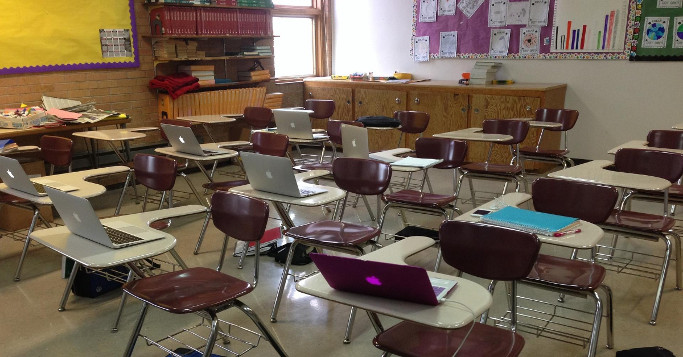
Banning cell phones in class or embrace a digital classroom? Hardly any topic is as controversial as digitisation and school. And of course the craziness surrounding around the “digital pact” shows that. 5 billion euros over five years, earmarked for this purpose, will be far from enough for all schools and teachers to finally get fit for digital transformation throughout Germany!
But wrong invoices are far from the only problem we face is the (digital) future of our educational institutions. But before it gets too political, let’s try today to translate a very specific recipe for success that we know from digital business into a vision of the future, »Better Schools Through Digitisation«: Personalisation.
Digital media as an opportunity for a better education
Personalisation is a top priority not just in e-commerce. When it comes to improving the education system, one should undoubtedly start at this point. The study also mentions »Personalised Learning with Digital Media«, which was created by an international research team on behalf of the Robert Bosch Stiftung.
Together with the Heidehof Foundation, the German School Academy and in cooperation with ZEIT, the Robert Bosch Stiftung has also launched the German School Portal —
» …an online platform for more good schools, presenting successful concepts from schools in practice and providing up-to-date information and contributions to educational policy and science. «
In the aforementioned study, the research team details the scope of personalised learning before presenting international use cases that have already enabled optimised learning and teaching through digital media. And here too we find parallels to e-commerce. Because whether customer, student or teacher — it’s about communication and interaction, and therefore the popular questions: Who? Where? When? What How? Why?
According to the study, personalisation for students refers to
- Why something should be learned (learning goals)
- How to learn something (learning approach)
- What should be learned (learning content and learning path)
- When something should be learned (learning speed)
- Who should learn something (learner or learning group)
- Where something should be learned (learning context)
Personalisation as a key to success
Of course, the user analogy, customer and student, is limited. But just as every customer ticks differently and has different ideas and preferences, students need personalised content and personalised attention to understand the mass of content they need to absorb during their school career. So the ideal case.
And how does that work? On the personnel side, this claim can certainly not be implemented effectively and sustainably. Why? A shortage of teachers.
With a demand for personal attention to individual students, individualised educational content or even homework formats, the demand for trained skilled workers only is increasing without limits.
But this venture is not impossible. Let’s draw the parallels to e-commerce again. After all, there is no single supervisor per customer to make personalisation possible.
Sure, there are contacts, customer service, and chats. But behind all personalisation, be it tailor-made content, marketing campaigns that can be played individually or an all-round service, in order to offer the customer added value, digital interfaces and systems are needed.
Similar to a good CRM and PIM system behind an online shop, it would also need a functioning, integrated system landscape for students, teachers, teaching and learning materials, and content.
As so often, however, a theory is simpler than practice. Not enough money, not enough willingness to change, and too many bureaucratic/political hurdles. In addition, education in Germany is still a matter of the country. And even without a digital pact, that’s already a number in itself.
Promising use cases
But there is no shortage of ideas and concepts, as shown by the multitude of tools and systems that the research team of the study “Personalized Learning with Digital Media” has shown.
One of these is ASSISTments, for example. This free (!), online tutoring helps students with the help of an AI for math homework, personalized for every user of course. Poor-performing students can catch up with personalised learning paths, instant feedback, and tips.
Teachers also have insight into the learning progression of individual students through the program. So far, the tool is only available in English, but the manufacturer has promised that a German version should be released in the near future.
Textbook-based learning platforms such as “Kapiert.de” offer interactive exercises and explanatory videos that build on and complement the contents of textbooks.
With Google Classroom and IBM Watson Education Solutions, of course, big names in the digital business are also trying to get on the educational bandwagon. However, such complex and large-scale programs are not only a difficult endeavour under data protection laws, but also demand a lot of knowledge and, above all, retention of users (especially teachers).
More autonomy in learning, on the other hand, should be promoted by a »Smart Learning Partner«. Through a prototype program from Beijing, students can, among other things, connect with thousands of coaches and tutors — like a matchmaking app for students and teachers.
In Singapore »Spectra Secondary School« redefines frontal education. In the so-called »Flipped Classroom«, students are already in the subject thanks to pre-explanatory videos at their best before the actual lessons begin. There, they then work on the topics presented in the video via online tasks and evaluations by the teacher.
Digital competence is everyone’s business
The digital opportunities explored in the study to enhance personalized learning are
» …not a miracle cure, but a promising approach that should be pursued «
said Heike Schaumburg, study author and educational scientist at the Humboldt University in Berlin.
We agree. After all, the fact is that in the future it will be very difficult, if not impossible, to find a (good) job without digital skills. And who should do it? Schools? That could be difficult given the current status quo. After all, it’s the schools themselves that are not yet fully digital-literate.
Never stop learning
With our annual Trend Book we’ll show how digital customer relationships, artificial intelligence (AI), and new work shape the future of digital transformation. In addition to trends and industry insights, our trend book, exclusive to retailers, manufacturers, and publishers provides up-to-date facts and figures for brands in the digital age.
Retailers, manufacturers, and publishers can preorder the new trend book here for free and get the 2018 edition now.



![Business Intelligence in Agriculture: How KWS Benefits from Data-Driven Decision-Making [Success Story] Business Intelligence in Agriculture: How KWS Benefits from Data-Driven Decision-Making](https://www.handelskraft.com/wp-content/uploads/sites/2/2023/01/business-intelligence-in-der-landwirtschaft-wie-kws-von-datengetriebenen-entscheidungen-profitiert-success-story_beitrag-1024x538-1-190x100.png)
![Digital Consulting to Build Stronger Customer Loyalty: How Sparkasse Jena-Saale-Holzland Is Increasingly Attracting Relevant Target Groups [Success Story] Digital Consulting to Build Stronger Customer Loyalty: How Sparkasse Jena-Saale-Holzland Is Increasingly Attracting Relevant Target Groups](https://www.handelskraft.com/wp-content/uploads/sites/2/2022/10/digital-consulting-fuer-verbesserte-kundenbindung-wie-die-sparkasse-jena-saale-holzland-verstaerkt-relevante-zielgruppen-fuer-sich-begeistert_beitrag-1024x538-1-190x100.jpg)
![Buy Now, Pay Later: How the Right Payment Method Increases the Willingness to Buy in B2B and B2C [5 Reading Tips] Buy Now, Pay Later Reading Tips](https://www.handelskraft.com/wp-content/uploads/sites/2/2022/08/buy-now-pay-later_handelskraft_lestipps_beitrag-1024x538-1-190x100.jpg)